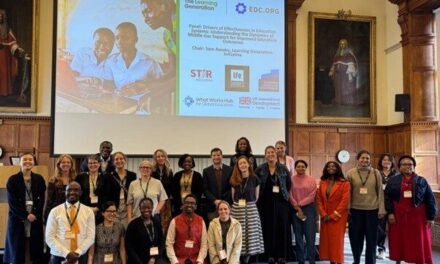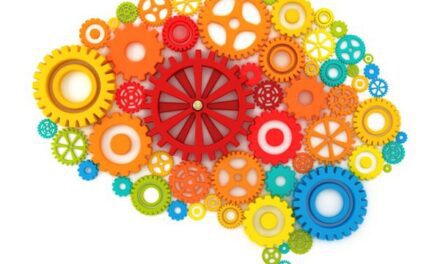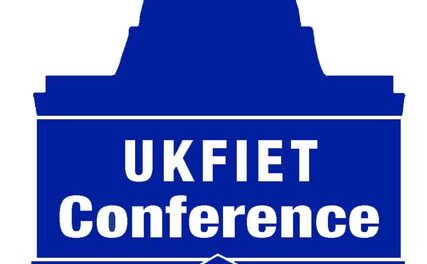This blog was written after the UKFIET September 2025 conference by the theme convenors of ‘Sustainable Development Goals’, one of seven conference themes: Najme Kishani, PAL Network, and Rona Bronwin, Foreign, Commonwealth & Development Office.
Imagine a world where every child has access to quality education, where learning is a joyful journey, and where communities are empowered to shape their own educational destinies. This vision often feels distant amidst global challenges. Yet, at the recent UKFIET 2025 conference in Oxford, a vibrant community of educators, researchers, practitioners, philanthropists and policymakers came together, not just to discuss these challenges, but to illuminate pathways forward.
With only five years left until 2030, the deadline for achieving the Sustainable Development Goals, the sense of urgency ran through the conference. Together, a shared commitment to accelerating SDG achievement through education and training, was explored, guided by three powerful forces: mobilising knowledge, forging dynamic partnerships, and sparking transformative innovations.
Mobilising knowledge: Beyond the numbers
‘Whose knowledge is being valued?’ was a recurring question throughout sessions at the conference, ranging from early years, to language of instruction, and research synthesis, to the role of communities. Listening to a community organiser from Ghana describe an indigenous home‑based learning model co‑created by parents and local educators, it is clear how far we still must travel to bridge global frameworks and local realities. Yet there was hope in the story: proof that when families are given agency, early childhood programmes become more resilient and culturally rooted. Examples from men in Afghanistan, Dalit women in India, and remote communities in Nepal, all reinforced the message from Ghana – starting with knowledge that is known and valued in the community leads to sustainable, collective, cost-effective solutions. This left the question; how can we better recognise and build on local and indigenous knowledge to accelerate sustainable development?
Meanwhile, a symposium of researchers posed the question ‘what would it look like to have a shared global knowledge base that people can contribute to organically and that can be applied in a contextualised way? The panel highlighted the ongoing gap in education evidence synthesis. It signposted innovative ways that organisations are working together to mobilise infrastructure for better access and democratisation of education evidence synthesis globally.
Later, in a panel called ‘From Metrics to Meaning’, the conversation shifted to the politics of data in the face of the fact that half of all countries still do not systematically assess learning outcomes, leaving the progress of roughly 680 million children invisible. The session challenged us to move beyond mere statistics. It highlighted that while global targets like getting millions more girls into school are vital, the data often fails to capture the nuanced realities of crisis-affected regions. We learned about the disconnect between what is counted and what truly matters, especially when conflicts and disasters disrupt education systems. The discussion emphasised the need for data that is not just timely and reliable, but also deeply embedded in the political economy of education, reflecting the real-world experiences of learners.
This was further explored by an exciting innovation presented by the Accountability for Gender Equality in Education (AGEE) project, which looks beyond gender parity, and is leveraging technology to analyse curricula for gender representation in far more sophisticated ways than ever before, to drive genuine equity. Building on this momentum, ongoing efforts to establish living evidence systems highlight the growing commitment to continuously update, synthesise and democratise educational knowledge, ensuring that diverse research — including that from non-English-speaking contexts — informs global learning dialogues.
Mobilising partnerships: The strength of unity
Knowledge, however profound, remains inert without collective action. We were reminded across sessions that evidence must speak to policymakers and offer alternatives. Efforts on learning data must first and foremost be to strengthen national capacity and inform policy dialogue to improve learning, not just satisfy global reporting. The session on foundational learning assessments showcased the emerging collaborations from household‑level citizen‑led surveys to national exam reforms, and the opportunities for a step change in progress towards tracking learning globally, led by citizens and national governments.
In another room, researchers and practitioners shared the power of looking at the quality of interactions, in schools and home, alongside learning assessments, to improve learning globally. The Engage toolkit, developed with educators and children across eleven countries to measure social and personal connection, curiosity and the emotional climate of classrooms, is now generating exciting results. These results are showing that emotional engagement is a powerful predictor of learning and the toolkit is providing concrete feedback for teachers to be able to improve practice. This session illustrated how global organisations, local NGOs and researchers can unite to create practical, scalable solutions that impact children’s educational experiences.
Some powerful insights came from the ground up, showing how genuine partnerships thrive when communities are co-creators of change. Stories from places like Nepal demonstrated that when local knowledge is valued and community-led initiatives take the lead, learning poverty can be reduced and inequities confronted at their roots. These examples reminded us that true collaboration extends beyond projects and policies, it lives in the agency and resilience of the communities themselves.
Mobilising innovations: Charting new horizons
With knowledge refined and partnerships strengthened, the stage is set for innovation to flourish. The conference was a testament to the creative spirit driving education forward. A session on EdTech explored how technology and data-driven insights are not just tools, but catalysts for transforming learning environments. The session presented adaptive literacy tools used in under‑resourced South African schools and community‑based open schooling models that blend radio broadcasts with local tutoring. Yet presenters were quick to caution against techno‑solutionism. Innovative solutions, deeply embedded and created in local realities to serve marginalised learners, were shared as ways to challenge and shift entrenched power dynamics and inequities The closing remarks of a symposium on multilingual education, reminded us that education is political and language is political; and the question resurfaced again of whose voice is heard and included and whose is silenced.
The session on ‘Empowered Educators’ focused on new strategies to empower educators, acknowledging that a motivated and well-supported teaching force is central to any educational transformation.
A unified vision for 2030 and beyond
By the final day of the conference, the themes of knowledge, partnership and innovation had begun to blur. A creative workshop challenged participants to imagine a post‑2030 education agenda. At our table sat a teacher from Nigeria, a doctoral student from Pakistan and a representative from a Kenyan ministry. Together, we sketched a vision where data is used to empower rather than punish, where partnerships respect local leadership and where technology is harnessed to expand, not limit, possibilities. We argued that education must be both a shield against crisis and a catalyst for just, sustainable futures.
The SDG sub-theme at the UKFIET 2025 conference was a powerful narrative of hope and determination even – and maybe especially – in the face of the growing polycrisis, and the demise of international education. These tectonic shifts taking place underscored that achieving the Sustainable Development Goals through education is not a singular effort, but a dynamic interplay of mobilising knowledge, fostering robust partnerships, and embracing bold innovations. Each thread, woven together, creates a stronger, more resilient fabric for education globally. This moment invites open minds and collaborative sprits, to listen carefully to the voices and knowledge of learners everywhere; and use the undeniable collective will to innovate, partner and learn as we all look towards 2030 and beyond.




